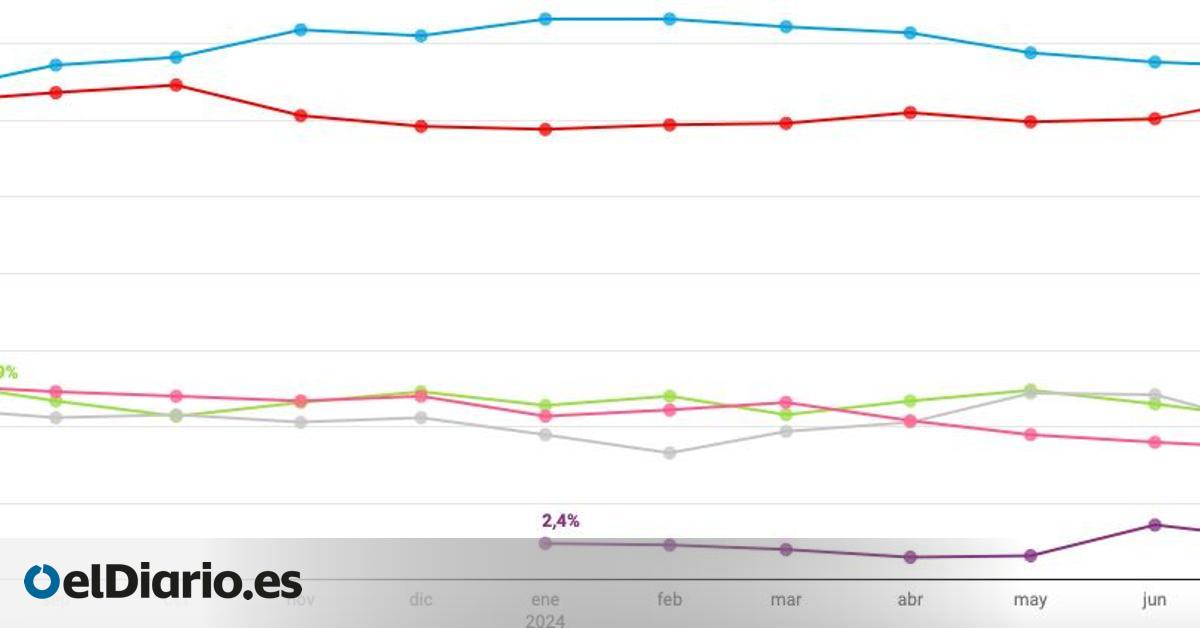
One year after the general elections of July 23, 2023, the two parties with the most votes at the state level, PP and PSOE, maintain similar percentages of support to those of those elections, according to the various surveys prepared by Simple Lógica for elDiario.es. Since last summer, however, their voting estimates have registered fluctuations in a turbulent period in politics although one of economic prosperity, as indicated by all indicators.
The last twelve months have been marked by the formation of a new left-wing government, the approval of the amnesty law that guaranteed support for that Executive and the end of the electoral cycle with the elections in Galicia, Euskadi, Catalonia and, finally, to the European Parliament. The recent investiture of Salvador Illa has also led to a change in the Catalan cycle that will determine the remainder of the legislature at the state level. And all this has been punctuated by the raising of the tone of the right-wing parties that delegitimize the action of Pedro Sánchez, the protests in the streets promoted by PP and Vox and the action of the courts.
However, the electoral scenario for the two major parties remains very similar, according to the polls. The parties that came in third and fourth place, however, have suffered significant falls in their voting expectations. On June 23, the third force was Vox, closely followed by Sumar. Now the advantage of the extreme right is greater, although both are showing signs of the wear and tear of competing with other forces on the same ideological spectrum, Podemos and Se Acabó La Fiesta, the group of the ultra-right agitator Alvise Pérez.
The PP was the leading force in the last general election: it obtained 31.9% of the votes. It was followed by the PSOE with 31.2% of the votes, seven tenths below, although Pedro Sánchez’s party managed to win the contest because in the end it was they who obtained sufficient parliamentary support to form a government.
Taking into account the latest survey carried out by Simple Lógica for elDiario.es, in July, the current scenario is similar: the PP would continue to lead the ranking, even with a higher percentage of votes than on 23 June (33.5%) and the PSOE would continue to be second, also with a slight increase (31.6%). The advantage of the Popular Party, however, is now 1.9 points.
That superiority of Alberto Núñez Feijóo’s party, however, has been much more pronounced over the last year if we look at the evolution of the vote in the Simple Lógica polls. Between July and October, support for the two parties grew, although more markedly in the case of the PP. But the turning point was November. On the 9th of that month it was learned that Sánchez had agreed to an amnesty law with Junts and ERC in exchange for guaranteeing the support of both parties. And, from then on, support for the PSOE plummeted, even though Sánchez managed to be invested as president on the 16th of that month.
All this coincided with the outbreak of far-right protests – several days of violent acts – around the Socialist headquarters on Ferraz Street in Madrid. For nearly a month, several hundred people gathered there every night against the amnesty, insulting Sánchez, the left, and even the Constitution and the king. Some prayed the rosary while leaders of ultra parties with Francoist flags shouted “Pedro Sánchez, son of a bitch” or in favour of applying the “vil garrote” to the press. Leaders of Vox attended the rallies and were encouraged by their youth, in what the most extreme movements called National November.
The PP and PSOE became even more pronounced after this, while Vox also continued to grow. Coinciding with the first parliamentary debate on the amnesty law, the PP obtained 36.6% of the votes, compared to 29.4% for the PSOE, which was 7.2 points behind Feijóo’s party.
With the start of the electoral cycle, the differences began to narrow, but the polls at the state level did not exactly coincide with the results of the three regional elections and the European elections in June. In the first date with the polls of the year, the Galician elections on 18 February, the idea of the PP losing its absolute majority hovered, but it ended up revalidating it for the fifth consecutive time, which meant a great boost in its support. But from March onwards, the trend of the Simple Lógica estimate at the state level was downwards for the Popular Party and upwards for the Socialists, who took a breather with Euskadi and Catalonia, and saved face in the European elections.
The beginning of May was marked by the five-day reflection period that Pedro Sánchez took after Judge Juan Carlos Peinado opened an investigation into his wife, Begoña Gómez, based on the allegations of Manos Limpias based solely on information and hoaxes. The unprecedented decision had hardly any impact on the polls.
May was the month in which the Catalans made Salvador Illa’s PSC the leading force and, at the national level, the gap between the two major parties continued to narrow. The PP then obtained 34.4% of the votes according to the polling company’s estimate, and the PSOE, which registered a slight decrease, was left with 29.9%. The advantage of the Popular Party was therefore 4.5 points. In June, when the PP won the European elections, its fall continued unstoppable in the national polls and this gap was reduced to 3.7 points (33.8% for the PP and 30.1% for the PSOE).
The cycle was closed with the July survey, exactly one year after the general elections. The estimate gave the PP 33.5% of the support compared to 31.6%, with only 1.9 points difference. The trend therefore brings the current scenario closer to that of 23J, after only six months ago the advantage of Feijóo’s party reached more than 7 points.
Coinciding with the fall of the last six months, the PP launched some of the most radical policies in the communities that until June it governed with Vox and there was also a staging of a break by Santiago Abascal’s party – who left all the autonomous governments with the PP but not from the hundreds of town councils in which they maintain their alliances – as well as the emergence of a new actor on the far right, that of the agitator Alvise Pérez who won three MEPs in the European elections. The break sponsored by Vox occurred due to the PP’s decision to welcome migrant minors in its autonomous communities.
The evolution of the main far-right party has been downwards over the last year, after the blow that 23J already represented for Abascal’s party, which went from 15.08% of the vote in the November 2019 elections – which translated into 52 deputies in the last legislature – to 12.9% in the 2023 elections, which left them with 33 seats. None of the monthly surveys carried out by Simple Lógica have given them such a high percentage of votes since then.
The decline in its voting estimates sank to 10.7% from July to October, at the same time as the intention to vote for the PP, its main rival for the same right-wing electorate, grew. However, Vox also grew in November, when the agreement between Pedro Sánchez and Junts was announced, which guaranteed the investiture of the former thanks to his commitment to approve an amnesty law for those indicted for the independence process in Catalonia. It reached its peak in December, when the most violent protests took place in Ferraz, although the percentage was lower than that of 23J and stood at 12.3% of the votes.
Abascal’s party then fell again in January, to 10% of the votes. Coinciding with the start of the electoral cycle that did not exactly start positively for the far right – in Galicia Vox did not achieve representation – its rating improved in February (12%) and fell again in March to 10.8%. Without ever recovering the support of 23J, the right-wing party grew again in April (11.7%) and May (12.2%). Precisely in that last month Abascal recorded a good result in the Catalan elections and managed to maintain the 11 deputies in the Parliament that he had in the previous legislature.
In June, a milestone occurred that marked the fall of Vox, which has been reflected in the polls ever since: the decision of the ultra-right agitator Alvise Pérez – who once collaborated with Abascal – to run in the European elections in June. Se Acabó La Fiesta competes directly for the most extreme electorate and made a dent in Vox in those elections to the European Parliament, in which it initially hoped to considerably improve its presence in the heat of the extremist wave across the continent. In the end, Abascal’s party managed only two more seats than they had in the previous legislature and was left with six, while Alvise’s group stormed in with three.
The latest Simple Lógica poll, from July, gives Vox 10.5% of the votes, two points less than the percentage it achieved at the polls a year ago.
In contrast to the fluctuations of Vox, the internal divisions within the left-wing party determined a constant downward trend for Sumar, which on June 23 was the fourth force with 12.7% of the votes, just two tenths below the extreme right. The fall of the minority partner of the Government was constant from July to November, it recovered some support in December and sank in January, when the Simple Lógica survey gave it an estimate of 10.7% of the electorate.
On December 5, the space broke up with Podemos’ decision to leave the Sumar group in Congress – despite having run under the acronym founded by Yolanda Díaz – and move to the Mixed Group. However, Sumar recovered until March (when it reached 11.6% of the votes), which was when it began a free fall that has led it to reach, in the last survey in July, just 8.6% of the support.
The electoral cycle was terrible for the group. It did not achieve representation in Galicia and barely obtained a representative in Euskadi, where for the first time Sumar and Podemos ran separately, subtracting five seats from the six that the union of Podemos-IU-Alianza Verde had achieved in 2020. In Catalonia, the confederal brand was once again that of the comuns, which tried to advance outside the division and obtained six representatives, two less than in the previous elections. And, in the European elections, Sumar was left with three seats and Podemos, with two. The sum of both – five seats – was behind the six representatives that Belarra’s party obtained in 2019.
The configuration of the lists for these European elections was precisely what caused Sumar to burst into tears as a unifying force for different political forces, and several of the parties that make it up, such as IU, Compromís or Más Madrid, openly showed their disagreements with the management of Yolanda Díaz, who ended up leaving the coordination of the movement, after the fiasco of the European elections.
Podemos alone has not managed to reach the 4% barrier in all the polls that have been carried out since its split with Sumar in January. In the survey of that month, which was the first time that it was asked separately, Belarra’s party barely reached 2.4% of the votes. It fell to a minimum of 1.5% of the votes in April and recovered significantly in June (to 3.6%) coinciding with the boost provided by having the former minister Irene Montero as head of the list in the European elections. In the last survey, in July, Podemos fell again to 2.7% of the votes.
Source: www.eldiario.es

